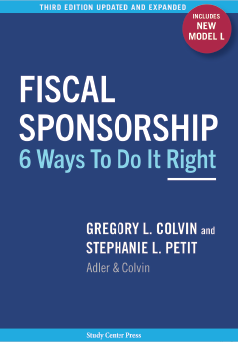Project Intake Checklist
If you are a fiscal sponsor, how much do you need to know about a new project before you decide to take it on? Obviously, you will want a written application stating its purpose, proposed activities, budget, personnel and advisory committee or board. There might be more to find out, to determine whether it will be a Model A, B or C project and whether it has a history with another sponsor or a founder that you need to address in the fiscal sponsorship agreement.
Here’s a checklist of 15 questions to ask about the new project.
1. Summarize the charitable purpose of the project in a single sentence.
2. Are they starting from scratch, with no prior activities? If not, answer 3 to 6 below.
3. Do they have a prior fiscal sponsor? What is the sponsor’s attitude toward the transfer?
4. Who has been conducting the prior activities? The founder or project director personally? A for-profit entity of theirs? Have they created a nonprofit entity?
5. Are there any assets or liabilities to transfer in, i.e. cash balance, grants payable, bills to be paid?
6. Has any significant intangible property (i.e, intellectual property such as trademarks, copyright in works created, contact lists) been created or acquired already? If so, how will such property be used in the project? Will such property be completely transferred (assigned) to us for the project or merely licensed to us by the original owner?
7. Does the project want Model A, B, or C fiscal sponsorship?
8. Will the project personnel be engaged as our employees, volunteers, or independent contractors?
9. Is the entire activity to be performed by a single independent contractor, so that Model B might be the most appropriate?
10. Has the project raised any money yet, in hand or committed? From whom and how much?
11. Does the project plan to earn income through sales or services, i.e., related or unrelated business activities? Through fundraising events? Other unusual means?
12. What are the project’s insurance needs, if any, and/or activities involving risk exposure?
13. Does the group propose any political or lobbying activity, and if so, what?
14. Does the group appear to have needs or issues that would make them more or less administratively difficult?
15. How did they hear about us?

The 3rd edition of Fiscal Sponsorship: 6 Ways To Do It Right is available ONLY from Study Center Press at FiscalSponsorDirectory.org